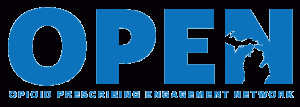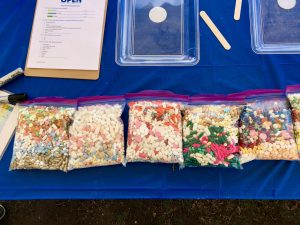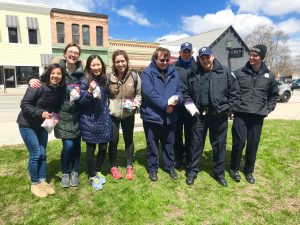Finding a Familia in Medical School
Among the many unexpected surprises I’ve encountered in medical school has been the profound impact of one particular organization on my experience here — the Latin American Native American Medical Association (LANAMA), the University of Michigan’s chapter of the national Latino Medical Student Association (LMSA).
As an M1, this organization served as a way to meet and learn from peers at different stages in medical school who either consider themselves Latinx or who care deeply about Latinx health. Every year, we host a variety of events to foster community and mentorship between students, residents, and faculty; we coordinate a model Medical Spanish program that includes both intermediate and advanced levels; and we serve the local Latinx community through an annual health fair and as volunteers at mobile clinics for migrant farm workers during the spring and summer months.
Through my involvement at the local level, I became interested in learning more about the larger LMSA outside of UMMS. Since attending my first LMSA Midwest conference, I have been continually impressed by the passion and impact that students bring to their respective medical schools. Needless to say, I have jumped at every opportunity to become more involved in this organization that has not only supported me in my medical school journey, but which has also helped me bring that impact to Michigan.
This year, I have the privilege of serving for the first of two years as co-director of the Latino Medical Students Association Midwest (LMSA MW). The position performs various roles, including leading the organization in achieving its mission, directing and supporting the regional board members in their various roles, and representing the region as members of the national Board of Directors. When I ran for the position, I articulated that my main goal for the organization would be to strengthen the leadership team by supporting various leadership education opportunities, such that we would be better able to serve medical students across the region and function as a more cohesive community.

To that end, I organized the first annual LMSA MW board retreat, hosted by the University of Chicago Pritzker School of Medicine, during which our leadership team engaged in visioning and strategic planning for the year. While each board member made objectives for their respective position, our collective goals could be summarized in creating an infrastructure and resources to help Latino pre-medical and medical students to feel supported with mentors and opportunities to learn, lead, and serve their local Latino community through medical care and advocacy.
The annual House of Delegates conference over the weekend was therefore tailored to achieve those goals – it was an opportunity an opportunity to gather >60 student leaders from across the Midwest region to cultivate our leadership skills, plan out our organizational objectives for the year, and strengthen our network among Latino medical students, residents, and faculty. Our morning consisted of speaker panels covering topics including “What makes a good leader?”, “Advocacy and Caring for Underserved Populations,” and “Imposter Syndrome.” Our panelists were physicians and residents who were either immigrants themselves, or children of immigrants, and could speak to the unique challenges they have faced in pursuing their careers, as well as the special motivations they have to serve the community they come from.
A particular highlight of the morning for me was the session on “Imposter Syndrome,” during which Dr. Denise Martinez, Associate Dean for Cultural Affairs and Diversity Initiatives at UICOM, spoke first about her experience, then had us break into small groups to discuss different questions. When the group reconvened from the first break-out question, one student poignantly asked what to do when a failure seems to affirm all of the doubts one carries with “Imposter Syndrome.” I felt compelled to address her question in front of the full group with my own personal experience, and was so touched and impressed that it led many other students to share their own experiences and advice in front of such a large group of their peers. While this session was one of many on our agenda, I think the vulnerability and honesty that took over the room created an environment ripe for all of us to support each other not only on an organizational level – for example, one school’s chapter collaborating with another for a service event – but perhaps more importantly on a personal level, such that in the future we will be able to confide in each other and support each other from afar.
The afternoon of the conference consisted of the business meeting, during which my co-director and I presented our plans for the year, and our board presented their specific initiatives for their respective positions. In particular, we led a session to educate the conference attendees about the importance of policy and advocacy in anticipation of our annual LMSA Policy Summit in Washington, D.C. We also updated the group on our progress in organizing the annual LMSA National Conference, to be hosted by the University of Washington in St. Louis this March, and for which we have chosen the theme of “Unidos en Medicina y Mas: A Holistic Approach to Latinx Health.” Finally, we ended the day hosting a raffle fundraiser for a children’s clinic at the US-Mexico border in El Paso, TX; it was an opportunity to connect with the Latino community in Iowa, and to get a little salsa dancing in as well.

Overall, the LMSA MW House of Delegates conference was as successful as I could have hoped for, and I am grateful for the opportunity I had to participate in person in this event which I spent so much time helping to plan. Over the years, the Latino Medical Students Association has truly become a family and source of support for me in my medical school experience, and I look forward to continuing to give back to that community by helping to improve the organization as it provides that type of support to future students.
Hopefully you’ll consider joining us at LANAMA events here at Michigan throughout the year, and at the national LMSA conference at Washington University in St. Louis from March 6-8. We would love to have you! Thanks for reading, hasta pronto, y ¡vamos azúl!
Gracia is a third-year student at the University of Michigan Medical School. She is interested in pursuing general surgery, and is particularly interested in pediatric and global surgery. Her passions include medical education, Latinx health, food, music, and all things outdoors.

 Michigan Opioid Prescribing Engagement Network (
Michigan Opioid Prescribing Engagement Network (
